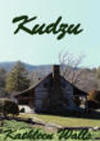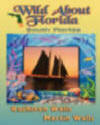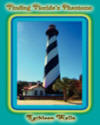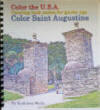Amelia Island:Like No Place Else on Earth
Story and photos by Kathleen Walls
It's no wonder Amelia Island is such an interesting place to
visit. The blend of cultures that have created this special
place differs from any other place on earth. It lived under
eight flags. It was special to people from pre-Columbian
Timucuans to pirates and con men, as well as hardworking
settlers from many countries. Today, it's a wonderful vacation
spot with fewer crowds than the better-known Florida beach
towns. Here are just some of the best things to do on Amelia
Island.
Welcome Center

The Welcome Center in Fernandina, Amelia Island’s main town,
is the perfect starting point. Out front you meet David Levy
Yulee who moved the island into the modern era. You can join
him on his bench and take a selfie. Inside, friendly staff
will give you brochures, maps, and information about Amelia
Island. The center is housed on a former railway station.
Appropriate, as David Yulee was the one who brought the
railroad there.
Amelia Island Museum of History
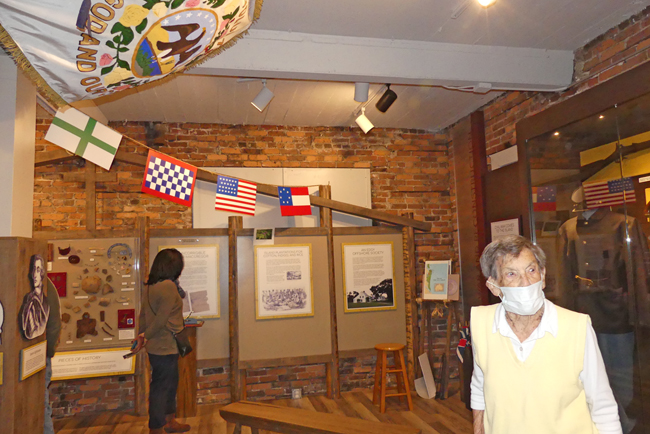
The Amelia Island Museum of History is the perfect starting
point to understand and enjoy Amelia Island. Its exhibits
range from the Timucuans to life in the Nassau County Jail
that now houses the museum. I recommend taking the Museum's
Eight Flags Tour to learn more. Our guide, Barbara, told the
island's history as we viewed exhibits for each era.

The
French founded the first colony composed of Huguenots fleeing
persecution in France. Pedro Menendez, who founded the nearby
Spanish colony of Saint Augustine in 1565, massacred the
French and raised the Spanish Flag over Northeast Florida.
England realized they were missing out on all island had to
offer, a deep harbor and freshwater, and they took over. With
a lack of policing forces, the island was easy prey and for
several days, a group calling themselves the patriots took
over. Next flag was raised by Gregory McGregor, a soldier of
fortune Scottish con-man. He represented a group called Free
America. Pirates loved the island for its harbor and access to
the Gulf Stream and its treasure laden shipping passing
nearby. Spanish soldiers joined American irregulars, and
French-born pirate Luis Aury, to run MacGregor out and claimed
the island for the Republic of Mexico. When the Civil War
began, Confederates seized unfinished Fort Clinch. Union
forces regained control of the fort on March 3, 1862, and
raised the American Flag.
Fernandina Plaza Historic State Park
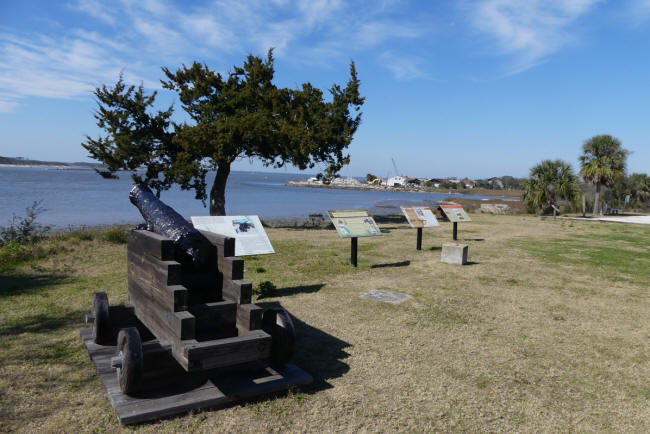
Florida’s smallest state park occupied less than an acre overlooking Amelia River. It is the historic site of Fort San Carlos, a Spanish fort dating back to the early 1800s protecting the original town of Fernandina. When David Yulee wanted to bring the railroad to Amelia, he moved the town to its present location. The park has a canon replica and several interesting informational signs about the area history.
Amelia Island Lighthouse

The 67-foot-tall
lighthouse was built in 1838 making it the
state's oldest lighthouse. The grounds are open to the public
on Saturdays from 11:00 am to 2:00 pm. There are lighthouse
tours on the 1st and 3rd Wednesdays of each month except city
holidays. It was built from bricks salvaged for the old
Cumberland Island Lighthouse.
Fort Clinch

Fort Clinch
is the place to go if you are an RVer or tent
camper. They offer two campgrounds; Atlantic Beach campground
has 21 RV and six tent-only sites. If you've never beenRVing
et, here's a good option.
Adventures made simple - Rent an RV from RVshare
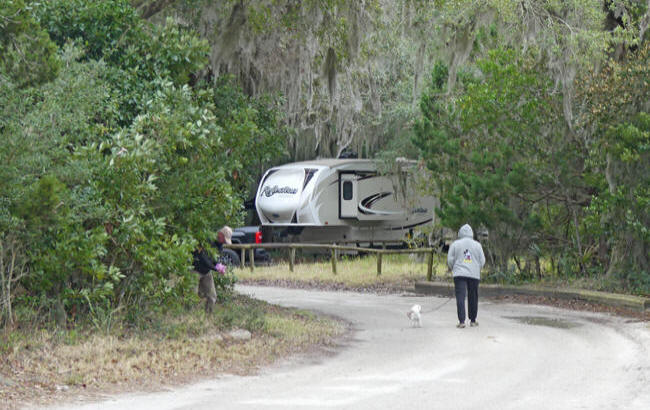 Amelia
River campground at the north end of the park on the banks of
the St. Marys River has 42 sites. My pick is the river
campground because it has Spanish moss-laden oak trees and
scrubs give each site some privacy, whereas the beach is bare
and open but has a beautiful beach. All campsites have a fire
ring, picnic table, water, and electric hook-ups. There is a
dump station on site. Your furry friends are welcome at both
campgrounds. Swimming, hiking, canoeing, or kayaking are all
popular here. Amelia Island is on the Great Florida Birding and
Wildlife Trail, so you will see some wildlife and many birds.
Amelia
River campground at the north end of the park on the banks of
the St. Marys River has 42 sites. My pick is the river
campground because it has Spanish moss-laden oak trees and
scrubs give each site some privacy, whereas the beach is bare
and open but has a beautiful beach. All campsites have a fire
ring, picnic table, water, and electric hook-ups. There is a
dump station on site. Your furry friends are welcome at both
campgrounds. Swimming, hiking, canoeing, or kayaking are all
popular here. Amelia Island is on the Great Florida Birding and
Wildlife Trail, so you will see some wildlife and many birds.
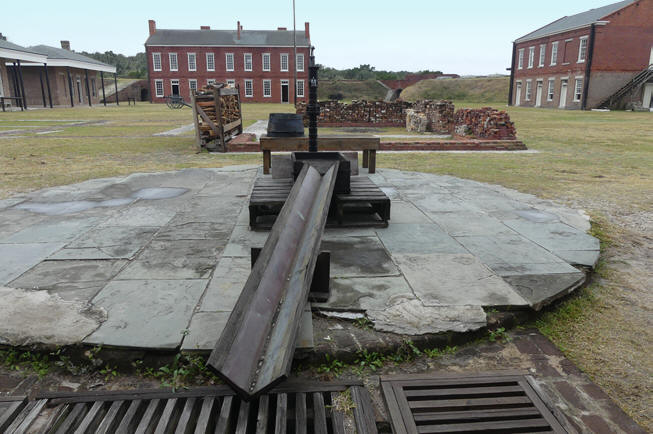
The first fortifications on the island started in 1736, but
construction of Fort Clinch began in 1847. By the start of the
Civil War, it was about two-thirds completed. At the start of
the war, it was under Confederate control. The Union gained
control in 1862 and finished building the fort. It was the area
headquarters during reconstruction.

The museum at the entrance to the fort has a video telling of
early workers' stories, ranging from the baker to the rugmaker.
You can tour the fort buildings, five bastions, guardrooms, the
prison, enlisted men's barracks, blacksmith shop, storehouses,
bakery, hospital, kitchens, lumber sheds and galleries. They
furnished each area to re-create the site as garrisoned by the
First New York Volunteer Engineers in 1864. There will always
be re-enactors to explain how things worked.

Cumberland Island Cruise

Take a ride on Amelia Island Cruises to Cumberland Island. On the cruise I took, Captains Benny and Bob took turns telling us about the history of Amelia and Cumberland islands. Both are interesting and well informed. We had an interesting view of Fort Clinch from the water. We saw several dolphins and lots of wild birds. The pelicans were very active. Captain Bennie told us the manatees come in to play here in warmer weather. It was a real thrill to see several wild horses grazing as we cruised around Cumberland Island.
Shrimping Musuem

If all you learned about Amelia Island’s shrimping industry
on the cruise has you curious, there is a small museum about
Amelia
Island’s shrimping history near the marina. For anyone
interesting in shrimping it’s free and very informative.
Maritime Museum of Amelia Island

A visit to the Maritime Museum of Amelia Island shows why pirates loved Amelia Island. The museum has models of galleons, some fantastic artifacts, and a map showing known wrecks along the coast. Many believe there is still lots of undiscovered treasure buried on Amelia Island. One display case has a jeweler's furnace shows treasure from sunken ships. On July 31, 1715, a Spanish treasure fleet composed of 12 ships ran into a storm on their way back to Spain. Eleven of the ships sank. Thousands of dollars' worth of gold, silver, and jewelry, including the Spanish queen's royal jewels and a small cast-iron Jeweler's Furnace, the only one like it in the world, were found near the south end of Amelia Island under three feet of sand.
American Beach
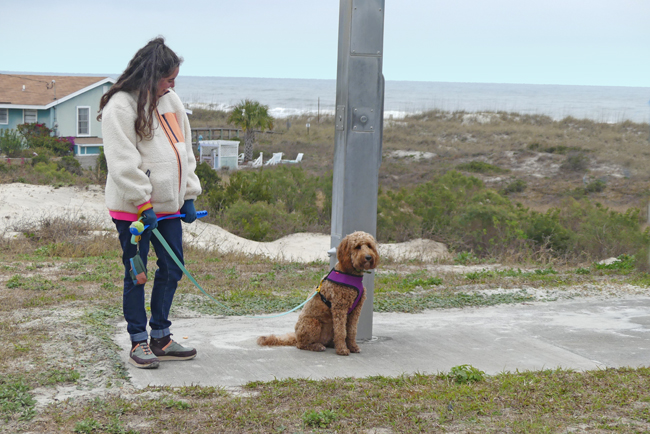
American Beach brings us into mid-20th century when old
prejudices still ruled. In 1935, the president of
Jacksonville's Afro-American Life Insurance Company, Abraham
Lincoln Lewis, wanted to build a beach retreat. You would think
"no problem" but there was one thing that made it almost
impossible; Lewis was Black. Jim Crow Laws restricted African
Americans' use of public beaches. Lewis hadn't gotten to and
Florida's first Black millionaire without learning how to deal
with problems.
He solved this problem by buying 33 acres of beachfront
property on the south end of Amelia Island. He invited
employees and friends to buy lots and build homes. He named his
resort American Beach and adopted the motto, "A place for
relaxation and recreation without humiliation." Later, he
expanded the community to 216 acres. By 1940, many of his lots
were still unsold. He offered them for sale to any member of
the black community. In its heyday, Evans Rendezvous, the
nightclub at American Beach, played host to celebrities like
Ray Charles, Cab Calloway, and James Brown. American Beach
boomed until 1964 when two things impacted it, Hurricane Dora
and the passage of the Civil Rights Act. When Black people
could go to any beach, American Beach declined.

American Beach history saw a new champion, MaVynee Oshun
Betsch, who came to be known as The Beach Lady. MaVynee was A.
L. Lewis's great-granddaughter and a world-famous opera singer
who performed in London, Paris, and Germany during the mid-
1950s and early '60s. As she saw American Beach decline in
popularity and be overtaken by McMansions and developers didn't
care about the environment, she gave up her career in 1975 and
returned to American Beach. She gave tours of the area from her
motorhome to educate visitors to the history of the beach. She
became a tireless worker for environmental causes. She lived
part of the time in an old cinderblock home where she could
gaze out at her favorite sand dune from the window on the
second floor. She named the dune NaNa which means ruler,
monarch, and grandmother in the Ghana language. NaNa is 60 feet
tall, making it the tallest dune in the Florida. When two
McMansions were built, blocking the dune, she lost her view,
but eventually she won the fight for NaNa's protection. In
2005, the year she passed away, the National Park Service
acquired 8.5 acres containing the NaNa dune guaranteeing its
preservation. MaVynee's ashes are buried atop NaNa.

American Beach Museum tells the history of American Beach with
photos, artifacts, and clothing, and it tells MaVynee's story.
When you visit, you can view NaNa. Dog friendly Burney
Beachfront Park has a boardwalk leading to the white sand
beach. There are picnic tables and restrooms here.
Downtown

In-between visiting all the fascinating places in Amelia
Island, take time to stroll around downtown. It’s filled with
interesting shops, galleries, and restaurants. It’s part of the
National Main Street Program to preserve older and historic
downtowns.
Dining
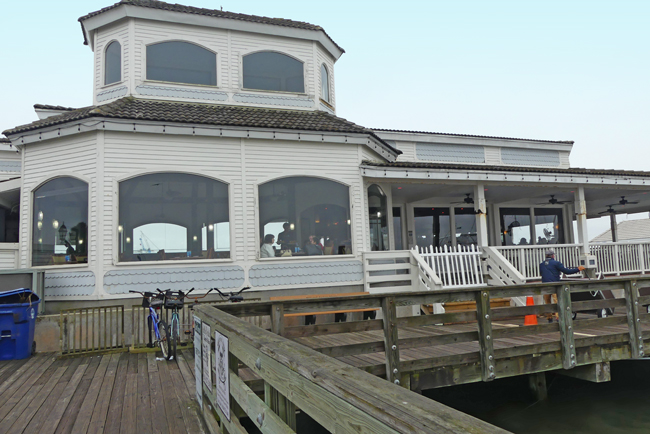 You
have so many choices for food and drinks here. If you want
waterfront dining, try Brett’s Waterway Café. We visited during
Amelia Island’s 14th annual Restaurant Week and Brett’s had a
special I couldn’t refuse, Turkey Divan, a casserole with
turkey, broccoli, and cheese, served with a jellied fruit salad
and for dessert Key Lime pie. My friend had a French Dip
sandwich. Service was great, atmosphere beachy, and food
delicious.
You
have so many choices for food and drinks here. If you want
waterfront dining, try Brett’s Waterway Café. We visited during
Amelia Island’s 14th annual Restaurant Week and Brett’s had a
special I couldn’t refuse, Turkey Divan, a casserole with
turkey, broccoli, and cheese, served with a jellied fruit salad
and for dessert Key Lime pie. My friend had a French Dip
sandwich. Service was great, atmosphere beachy, and food
delicious.
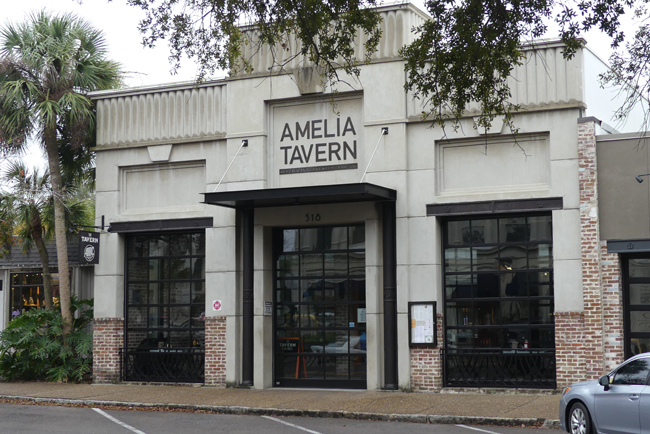
Another great dining experience is The Tavern. The food is American Southern, and it is also the first craft brewery in Fernandina Beach. It’s just about three blocks from the waterfront. I had the Buffalo wings. They were delicious. The sauce was somewhat lighter and had a sweet touch while not being too hot. My server Maryam was quick and attentive. The décor celebrated the end of prohibition with cute art and photos from the 1920s.

If you just want a drink, stop in at
the Palace Saloon. Folks from sailors to robber barons have
done just that since 1903. It’s Florida’s oldest bar. Louis G.
Hirth bought the Prescott building, as it was called then, in
1903 and named it the Palace Saloon. He had his friend,
Adolphus Bush, founder of Anheuser-Busch help the design the
bar.
When you step in past the welcoming pirate at the front door
and see the 40-foot mahogany bar, mosaic tiled, floors,
embossed tin ceilings, and wall murals, you see why this place
has appealed to so many for so long. When I visited last week,
Thaxton Rowe was playing and keeping us all warm with his
lively music despite record-breaking cold weather.
After enjoying a visit to Amelia Island, you will leave,
knowing you visited a very special place.
























